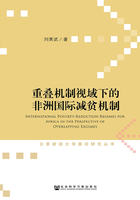
Abstract
Based on the empirical analysis of three major international poverty-reduction regimes for Africa, including United Nations, international financial regimes, bilateral aid regime, the dissertation raises a research question: Why poverty reduction goals set in international aid regimes can not be achieved? United Nations, the World Bank, OECD provided a large amount of official development assistance to poor countries in Africa, but Africa is still not on schedule to achieve the Millennium Development Goals. The dissertation argues that the overlapping structure of the international poverty-reduction regimes hamper Africa's poverty reduction goal.
In order to demonstrate research conclusion, a theoretical framework must be firstly established. This dissertation argues that the regime is operating mode of social order of life, and its main structure contains subject, ontology, and object. The functions of regime can be expressed as social governance. The dissertation lifts firstly the analysis of regime up to the level of international relations, so as to demonstrate the subject, object, ontology in regime is respectively international actors, problem area, international governance in the international regime. Then the dissertation develops the theory of overlapping international regime to demonstrate that the overlapping structure of international regimes can reduce their efficiency and effectiveness. Consequently the overlapping structure of international regimes must be reconstructed from the aspects of overlapping problem areas, overlapping actors, overlapping governance.
Secondly, an empirical research basis must be first established. According to the theoretical analysis framework, the dissertation outlines three major international regimes for poverty reduction in Africa: the United Nations regime, international financial regime, bilateral aid regime. On this basis, the dissertation analyzes the three major international regimes and their sub-regimes from the perspectives of problem area, actor, governance, then to explore the facts of international assistance to Africa by these international regimes for poverty reduction. And the dissertation analyzes deeply aid effectiveness by these international regimes, and finds a gap between the target and real effect.
Thirdly the dissertation analyzes overlapping structure in terms of problem area,actor and governance by combination with theoretical framework and empirical research,and finds conflicts and divergences among “poverty standard”,“status and role”and “poverty reduction measures”in three major international regimes,which reduces aid effectiveness and can not achieve poverty reduction goals.
Fourthly the dissertation presents a solution for reshaping the overlapping international regimes for poverty reduction. As the overlapping regimes affect aid effectiveness,“the Millennium Development Goals(MDG)”is off the track. Overlapping structure hurts effectiveness and efficiency of poverty reduction regimes. Based on the analysis of reasons for overlapping the dissertation reforms overlapping structure of international regimes for poverty reduction from the aspects of “poverty standard”,“coordination of assistance tools and aid agencies”,and “unification of decision-making system”,so as to enhance performance of international regimes for poverty reduction and achieve MDG on schedule.
Finally, the dissertation deepens its practical significance for China's peaceful development strategy. With the development of the new China-Africa strategic partnership China's aid to Africa widespread increasingly, and attracts close attention at home and abroad. Accordingly the dissertation maintains that firstly the criteria for LDCs must be specified as poverty standard, secondly standard aid system for poverty reduction in Africa must be established in term of international actor, and thirdly aid tools must be enriched in term of ontology, putting equal significance onto material aid and experiential communication. Developing aid regimes with Chinese characteristics helps African countries achieve poverty reduction goals.